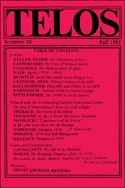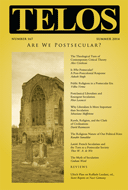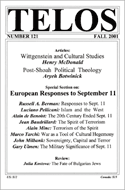By Telos Press · Monday, July 14, 2014  Telos Press Publishing is happy to announce that Joel Kotkin’s The New Class Conflict is now available for pre-order. The book will be released on September 1, 2014.Pre-order your copy here, and we will ship it as soon as it becomes available. Telos Press Publishing is happy to announce that Joel Kotkin’s The New Class Conflict is now available for pre-order. The book will be released on September 1, 2014.Pre-order your copy here, and we will ship it as soon as it becomes available.
Continue reading →
By Lewis West · Tuesday, July 1, 2014  Utopia is necessary: it alone “can rescue a very limited reality” (16). Without it we are shackled by the thoughts of others, confined within realms of possibility defined by those in power. Peace, disarmament—both can seem idealistic, even ridiculous. But our incredulity results not only from the distance of these concepts from the everyday. We have been taught to understand pacifism as impractical, disarmament as suicide. Utopia is necessary: it alone “can rescue a very limited reality” (16). Without it we are shackled by the thoughts of others, confined within realms of possibility defined by those in power. Peace, disarmament—both can seem idealistic, even ridiculous. But our incredulity results not only from the distance of these concepts from the everyday. We have been taught to understand pacifism as impractical, disarmament as suicide.
Continue reading →
By Russell A. Berman · Monday, June 16, 2014  Critical theory inherited classical accounts of social change that linked modernization processes to secularization: in order for societies to overcome traditionalist structures and pursue the accelerated development of modernity, they would have to escape the grip of religion. This is perhaps most famously the case for Marx, who, in the introduction to his Critique of Hegel’s Philosophy of Right, declared religion “the opium of the people,” blocking the way of progress: “The abolition of religion as the illusory happiness of the people is the demand for their real happiness. To call on them to give up their illusions about their condition is to call on them to give up a condition that requires illusions. The criticism of religion is, therefore, in embryo, the criticism of that vale of tears of which religion is the halo.” To surmount a social condition that produces unhappiness requires renouncing the systematic concealing of that condition which is, so Marx, the genuine function of religion, the ultimate paradigm of ideology as false consciousness. Critical theory inherited classical accounts of social change that linked modernization processes to secularization: in order for societies to overcome traditionalist structures and pursue the accelerated development of modernity, they would have to escape the grip of religion. This is perhaps most famously the case for Marx, who, in the introduction to his Critique of Hegel’s Philosophy of Right, declared religion “the opium of the people,” blocking the way of progress: “The abolition of religion as the illusory happiness of the people is the demand for their real happiness. To call on them to give up their illusions about their condition is to call on them to give up a condition that requires illusions. The criticism of religion is, therefore, in embryo, the criticism of that vale of tears of which religion is the halo.” To surmount a social condition that produces unhappiness requires renouncing the systematic concealing of that condition which is, so Marx, the genuine function of religion, the ultimate paradigm of ideology as false consciousness.
Continue reading →
By Telos Press · Monday, June 16, 2014 In this short video introduction, Telos editor Russell A. Berman discusses the themes and concerns of Telos 167 (Summer 2014): Are We Postsecular? You can read Russell’s full introduction here, and the issue itself is available for purchase in our online store.
Continue reading →
By Johannes Grow · Tuesday, June 3, 2014  The terrorist attacks on 9/11 created a chain of events that has led not only to the “othering” of Islam and its followers, but also to an increase in the securitization of society as a whole. In “Sovereignty, Empire, Capital, and Terror,” John Milbank examines the aftermath of the 9/11 terrorist attacks, notably the wars in Iraq and Afghanistan and the increasing intervention of governments into the privacy of their respective populations. He questions the wars and the increasingly illiberal turn by the government in regards to dealing with terrorists and criminals and the elimination of due process and, in some cases, habeus corpus. He writes that, “the question that one should ask in response to the immediate aftermath the events of September 11 is why there was outrage on such a gigantic scale” (146). He goes on to identify two reasons: first, the threat against the sovereign, and second, the increasing legitimization by Western governments to intervene in so-called “rogue or failed states,” to ensure the spread of the neoliberal market and prevent the defection of these states from the Western dominated capitalist system. Although there are indeed questions concerning the delineation between national security and the democratic process, the answers to these questions are harder to come by. The terrorist attacks on 9/11 created a chain of events that has led not only to the “othering” of Islam and its followers, but also to an increase in the securitization of society as a whole. In “Sovereignty, Empire, Capital, and Terror,” John Milbank examines the aftermath of the 9/11 terrorist attacks, notably the wars in Iraq and Afghanistan and the increasing intervention of governments into the privacy of their respective populations. He questions the wars and the increasingly illiberal turn by the government in regards to dealing with terrorists and criminals and the elimination of due process and, in some cases, habeus corpus. He writes that, “the question that one should ask in response to the immediate aftermath the events of September 11 is why there was outrage on such a gigantic scale” (146). He goes on to identify two reasons: first, the threat against the sovereign, and second, the increasing legitimization by Western governments to intervene in so-called “rogue or failed states,” to ensure the spread of the neoliberal market and prevent the defection of these states from the Western dominated capitalist system. Although there are indeed questions concerning the delineation between national security and the democratic process, the answers to these questions are harder to come by.
Continue reading →
By Telos Press · Monday, June 2, 2014 This month we’re celebrating 46 years of publishing the journal Telos by offering a 10% discount on all books and back issues purchased at our website. It’s been a long road since that fateful summer of 1968, back when the first issue of Telos appeared on the scene, but we’re still going strong thanks to the loyalty and support of our dedicated readers. Thank you for being a part of our continuing journey in worlds of philosophy, politics, and critical theory. You can take advantage of this month’s discounts by shopping in our online store.
Continue reading →
|
|
 Telos Press Publishing is happy to announce that Joel Kotkin’s The New Class Conflict is now available for pre-order. The book will be released on September 1, 2014.Pre-order your copy here, and we will ship it as soon as it becomes available.
Telos Press Publishing is happy to announce that Joel Kotkin’s The New Class Conflict is now available for pre-order. The book will be released on September 1, 2014.Pre-order your copy here, and we will ship it as soon as it becomes available.  Utopia is necessary: it alone “can rescue a very limited reality” (16). Without it we are shackled by the thoughts of others, confined within realms of possibility defined by those in power. Peace, disarmament—both can seem idealistic, even ridiculous. But our incredulity results not only from the distance of these concepts from the everyday. We have been taught to understand pacifism as impractical, disarmament as suicide.
Utopia is necessary: it alone “can rescue a very limited reality” (16). Without it we are shackled by the thoughts of others, confined within realms of possibility defined by those in power. Peace, disarmament—both can seem idealistic, even ridiculous. But our incredulity results not only from the distance of these concepts from the everyday. We have been taught to understand pacifism as impractical, disarmament as suicide.  Critical theory inherited classical accounts of social change that linked modernization processes to secularization: in order for societies to overcome traditionalist structures and pursue the accelerated development of modernity, they would have to escape the grip of religion. This is perhaps most famously the case for Marx, who, in the introduction to his Critique of Hegel’s Philosophy of Right, declared religion “the opium of the people,” blocking the way of progress: “The abolition of religion as the illusory happiness of the people is the demand for their real happiness. To call on them to give up their illusions about their condition is to call on them to give up a condition that requires illusions. The criticism of religion is, therefore, in embryo, the criticism of that vale of tears of which religion is the halo.” To surmount a social condition that produces unhappiness requires renouncing the systematic concealing of that condition which is, so Marx, the genuine function of religion, the ultimate paradigm of ideology as false consciousness.
Critical theory inherited classical accounts of social change that linked modernization processes to secularization: in order for societies to overcome traditionalist structures and pursue the accelerated development of modernity, they would have to escape the grip of religion. This is perhaps most famously the case for Marx, who, in the introduction to his Critique of Hegel’s Philosophy of Right, declared religion “the opium of the people,” blocking the way of progress: “The abolition of religion as the illusory happiness of the people is the demand for their real happiness. To call on them to give up their illusions about their condition is to call on them to give up a condition that requires illusions. The criticism of religion is, therefore, in embryo, the criticism of that vale of tears of which religion is the halo.” To surmount a social condition that produces unhappiness requires renouncing the systematic concealing of that condition which is, so Marx, the genuine function of religion, the ultimate paradigm of ideology as false consciousness.  The terrorist attacks on 9/11 created a chain of events that has led not only to the “othering” of Islam and its followers, but also to an increase in the securitization of society as a whole. In “Sovereignty, Empire, Capital, and Terror,” John Milbank examines the aftermath of the 9/11 terrorist attacks, notably the wars in Iraq and Afghanistan and the increasing intervention of governments into the privacy of their respective populations. He questions the wars and the increasingly illiberal turn by the government in regards to dealing with terrorists and criminals and the elimination of due process and, in some cases, habeus corpus. He writes that, “the question that one should ask in response to the immediate aftermath the events of September 11 is why there was outrage on such a gigantic scale” (146). He goes on to identify two reasons: first, the threat against the sovereign, and second, the increasing legitimization by Western governments to intervene in so-called “rogue or failed states,” to ensure the spread of the neoliberal market and prevent the defection of these states from the Western dominated capitalist system. Although there are indeed questions concerning the delineation between national security and the democratic process, the answers to these questions are harder to come by.
The terrorist attacks on 9/11 created a chain of events that has led not only to the “othering” of Islam and its followers, but also to an increase in the securitization of society as a whole. In “Sovereignty, Empire, Capital, and Terror,” John Milbank examines the aftermath of the 9/11 terrorist attacks, notably the wars in Iraq and Afghanistan and the increasing intervention of governments into the privacy of their respective populations. He questions the wars and the increasingly illiberal turn by the government in regards to dealing with terrorists and criminals and the elimination of due process and, in some cases, habeus corpus. He writes that, “the question that one should ask in response to the immediate aftermath the events of September 11 is why there was outrage on such a gigantic scale” (146). He goes on to identify two reasons: first, the threat against the sovereign, and second, the increasing legitimization by Western governments to intervene in so-called “rogue or failed states,” to ensure the spread of the neoliberal market and prevent the defection of these states from the Western dominated capitalist system. Although there are indeed questions concerning the delineation between national security and the democratic process, the answers to these questions are harder to come by. 

